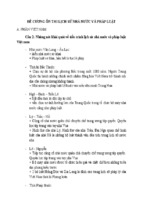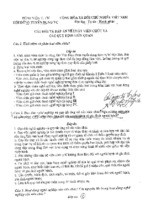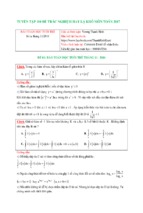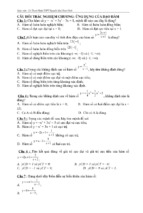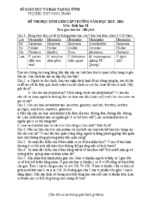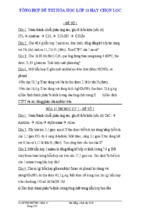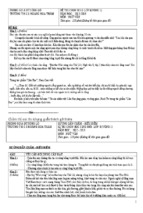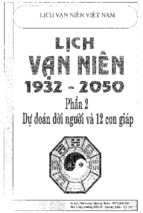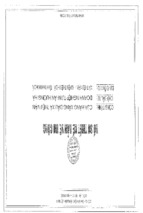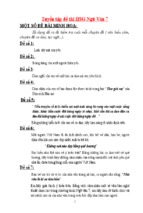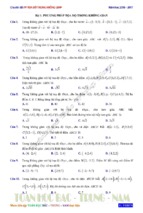Mô tả:
Moon.vn
Cô VŨ MAI PHƢƠNG – KHÓA NGỮ PHÁP
The future
Thì tƣơng lai đơn
I. Tóm tắt bài giảng
1. Hình thức
Khẳng định
(Affirmative)
will + V_inf (động từ nguyên
mẫu không 'to')
( I / we + will / shall + V_inf )
Phủ định
(Negative)
will not (= won't) + V_inf
shan't + V_inf
Nghi vấn
(interrogative)
Will + S + V_inf ?
Won't + S + V_inf ?
Lƣu ý: Ta ít khi dùng “shall” mà hay dùng “will” với “I / we”. Tuy nhiên, “shall” được dùng trong một
số trường hợp sau:
- Trong câu hỏi đuôi sau let‟s :
Let‟s go, shall we ? (Đi nào, phải không ?)
- Shall dùng cho ý quyết tâm:
Quyết tâm thường được diễn tả bởi will. Nhưng “shall” mang tính chất nhấn mạnh hơn:
We shall fight and we shall win. (Chúng ta sẽ đánh và chúng ta nhất định thắng).
2. Cách dùng
- Thƣờng dùng với các trạng từ chỉ tƣơng lai: tomorrow, next (week, month, year, summer, Sunday...),
in + một quãng thời gian (Ví dụ: in two years --> trong 2 năm tới)
Lưu ý: “in the last two years” = trong 2 năm vừa qua --> dùng với hiện tại hoàn thành
Ví dụ: I will (= I'll ) meet him tomorrow.
I shall be 26 next week.
- Cấu trúc: When + Mệnh đề 1 ở hiện tại, Mệnh đề 2 ở tƣơng lai
Ví dụ: When she finishes her work, I'll go out with her.
A. Để diễn tả ý kiến, ý giả định, ước đoán của người nói về tương lai. Những ý nghĩa này có thể được
trình bày bởi các động từ như: assume (cho là), be afraid (e ngại), be / feel sure (tin chắc), believe (tin),
doubt (nghi ngờ), expect (mong chờ), hope (hi vọng), know (biết), suppose (giả sử), think (nghĩ), wonder
(tự hỏi)
I hope that you'll get good marks.
I'm afraid that he won't come.
(I‟m sure) he‟ll come back. (Tôi tin chắc rằng hắn ta sẽ trở lại).
(I suppose) they‟ll sell the house. (Tôi cho là họ sẽ bán căn nhà).
- Đi kèm với các trạng từ chỉ khả năng như perhaps (có lẽ), will + possibly (có thể được) / probably (có
thể) / certainly / surely (chắc chắn) + V_inf:
(Perhaps) we‟ll find him at the hotel. (Có lẽ chúng ta sẽ gặp anh ấy ở khách sạn).
I will certainly come to help you.
1
Moon.vn
Cô VŨ MAI PHƢƠNG – KHÓA NGỮ PHÁP
B. Thì tương lai đơn được dùng tương tự cho các hành động theo thói quen ở tương lai mà ta cho là
sẽ xảy ra :
Spring will come again. (Mùa xuân sẽ lại về).
Birds will build nests.(Chim sẽ xây tổ).
C. Thì tương lai đơn được dùng trong câu điều kiện loại 1 chỉ các giả thiết có thể xảy ra trong tương
lai :
If I drop this glass, it will break. (Nếu tôi làm rơi cái ly này nó sẽ bể ngay).
When it gets warmer the snow will start to melt. (Khi trời ấm hơn thì tuyết sẽ bắt đầu tan).
I‟m putting this letter on top of the pile so that he‟ll read it first.
(Tôi để lá thư này trên đầu của chồng giấy tờ để ông ta sẽ đọc nó trước tiên).
3. So sánh Will với want / wish / would like
I will buy a car = I want to buy it = I intend to buy it (Tôi sẽ mua nó / Tôi muốn mua nó / Tôi dự định
mua nó).
Thì tương lai đơn nói về một quyết định mà không có kế hoạch trước và không chắc chắn sẽ diễn ra.
want = wish = would like + to + V_inf: diễn tả mong muốn, không có dự định từ trước.
Lƣu ý: Cách dùng “would like” trong câu mời:
- Would you like a cup of coffee ?
- No, thanks. I won't have anything.
4. So sánh 3 cách dùng sau:
- Tƣơng lai gần: “be going to V_inf”
- Hiện tại tiếp diễn dùng nhƣ một hình thức tƣơng lai “be V_ing”
- Tƣơng lai đơn: “will”
Ví dụ:
- I‟m meeting Tom at the station at six. (Đã có kế hoạch từ trước, Tom và tôi đã dàn xếp trước, chắc chẵn
sẽ diễn ra)
- I‟m going to meet Tom at the station at six. (Tôi sẽ gặp Tom tại ga lúc 6 giờ) --> Hành động có kế hoạch
ngay lúc nói, chắc chắn sẽ diễn ra. Nhưng không có dàn xếp với Tom nên Tom có thể sẽ ngạc nhiên.
- I‟ll meet Tom at the station at six. (Hành động không có kế hoạch, không chắc chắn sẽ diễn ra)
5. Be going to dùng cho dự đoán (prediction).
* Be going to dùng khi có dấu hiệu khiến người nói tin chắc một hành động sẽ diễn ra
Look at those clouds! It‟s going to rain. (Trông mây kia kìa ! Trời sắp đổ mưa rồi đấy).
* were / was + going to + verb: tôi đã định làm gì đó
I was going to meet Tom at the station but I got an accident.
II. Tài liệu đọc thêm
1. Thì hiện tại tiếp diễn dùng nhƣ một hình thức tƣơng lai :
- I‟m taking an exam in October. (Tôi sẽ có một kỳ thi vào tháng 10). Câu này ám chỉ rằng tôi đã
đăng ký thi rồi
- Bob and Bill are meeting tonight. (Bob và Bill sẽ gặp nhau tối nay) ám chỉ rằng Bob và Bill đã sắp
xếp trước cho việc này.
2
Moon.vn
Cô VŨ MAI PHƢƠNG – KHÓA NGỮ PHÁP
2. Be going to có thể được dùng với các mệnh đề chỉ thời gian khi chúng ta muốn nhấn mạnh chủ ý của
chủ thể :
He is going to be a dentist when he grows up. (Khi lớn lên anh ta sẽ trở thành nha sĩ).
What are you going to do when you get your degree ? (Khi nhận bằng cậu sẽ làm gì ?)
Tuy nhiên, thông thường thì tương lai đơn will / shall được dùng với các mệnh đề thời gian.
III. Bài về nhà
Exercise 1. Put the verb into the more suitable form, present continuous or present simple
I………………..(go) to the cinema this evening.
……………………….(the film / begin) at 3.30 or 4.30?
We……………………(have) a party next Saturday. Would you like to come?
The art exhibition…………………………..(finish) on 3 May.
I…………………………(not / go) out this evening. I……………………..(stay) at home.
„…………………..(you / do) anything tomorrow morning?‟ „No, I‟m free. Why?‟
We………………………(go) to a concert tonight. It…………………..(start) at 7.30.
I………………..(leave) now. I‟ve come to say goodbye.
– Have you seen Liz recently?
- No, but we……………………………..(meet) for lunch next week.
10. You are on the train to London and you ask another passenger:
Excuse me. What time …………………(this train / get) to London?
11. You are asking to Helen:
Helen, I………………………….(go) to the supermarket………………………….(you/come)
with me?
12. You and a friend are watching television. You say:
I‟m bored with this programme. What time………………………..(it/end)?
13. I………………..(not/use) the car this evening, so you can have it.
14. Sue…………………………..(come) to see us tomorrow. She…………………………(travel) by
train and her train…………………………..(arrive) at 10.15.
1.
2.
3.
4.
5.
6.
7.
8.
9.
Exercise 2. Put in „will‟ or „be going to‟:
1. A: We don‟t have any bread.
B: I know. I __________________ get some from the shop.
2. A: We don‟t have any bread.
B: Really? I __________________ get some from the shop then.
3. A: Why do you need to borrow my suitcase?
B: I __________________ visit my mother in Scotland next month.
4. A: I‟m really cold.
B: I __________________ turn the heating on.
5. A: Are you going to John‟s party tonight?
B: Yes. Are you going too? I __________________ give you a lift.
6. A: What are your plans after you leave university?
3
Moon.vn
Cô VŨ MAI PHƢƠNG – KHÓA NGỮ PHÁP
B: I __________________ work in a hospital in Africa. I leave on the 28th
7. (The phone rings)
A: I __________________ get it!
8. A: Are you ready to order?
B: I can‟t decide … Okay, I __________________ have the steak, please.
9. A: Are you busy tonight? Would you like to have coffee?
B: Sorry. I __________________ go to the library. I‟ve been planning to study
all day.
10. A: Why are you carrying a hammer?
B: I __________________ put up some pictures.
11. I can‟t lift this box. OK. I ………………………. help you. (will / am going to)
12. I don‟t think that she ………………………….. recognize me. (will / is going to)
13. Careful! You ……………………….. fall. (will / are going to)
14. The flight ………………………….. at 9 pm. (departs / will depart)
Exercise 3. Complete the sentences using the verbs in brackets. All the sentences are about the future.
Use will/won't or the present simple (I see / he plays / it is etc.).
1 I......................(phone) you when I ................(get) home from work.
2 I want to see Julia before she................................ (go) out.
3 We're going on holiday tomorrow. I .........................(tell) you all about it when we............. (come) back.
4 Brian looks very different now. When you................(see) him again, you.......................(not / recognise)
him.
5 ......................(you / be) lonely without me while I............................(be) away?
6 We must do something soon before it.............................. (be) too late.
7 I don't want to go without you. I .....................(wait) until you.................(be) ready.
8 Sue has applied for the job, but she isn't very well-qualified for it. I...................(be) surprised if
she........................(get) it.
9 I hope to play tennis tomorrow if the weather...............................(be) nice.
10 I'm going out now. If anybody...........................(phone) while I..................(be) out, can you take a
message?
4
Moon.vn
Cô VŨ MAI PHƢƠNG – KHÓA NGỮ PHÁP
Exercise 4 Make one sentence from two.
1 It will stop raining soon. Then we'll go out.
......................................................................when.......................................................................
2 I'll find somewhere to live. Then I'll give you my address.
I......................................................................when.......................................................................
3 I'll do the shopping. Then I'll come straight back home.
...................................................................after...................................................................
4 It's going to get dark. Let's go home before that.
...................................................................before...................................................................
5 She must apologise to me first. I won't speak to her until then.
...................................................................until...................................................................
Exercise 5. Read the situations and complete the sentences.
1 A friend of yours is going on holiday. You want to know what she is going to do.
You ask: What are you going to do when....................................
2 A friend of yours is visiting you. She has to go soon but maybe there's time for some more coffee.
You ask: Would you like some more coffee before...................................................................
3 You want to sell your car. Jim is interested in buying it, but he hasn't decided yet.
You ask: Can you let me know as soon as...................................................................
4 Your friends are going to New York soon. You want to know where they're going to stay.
You ask: Where are you going to stay when...................................................................
5 The traffic is very bad in your town, but they are building a new road at the moment.
You say: I think things will be better when they...................................................................
5
Moon.vn
Cô VŨ MAI PHƢƠNG – KHÓA NGỮ PHÁP
Đáp án
Ex 1
1. „m going
2. Does the film begin
3. are having
4. finishes
5. am not going/ am staying
6. Are you doing
7. are going………..starts
8. am leaving
9. are meeting
10. does this train get
11. am going…………..Are you coming
12. does it end
13. am not using
14. is coming………is travelling……….arrives
Ex 2
1. am going to 2. will 3. ‟m going to 4. will 5. will 6. ‟m going to 7. will 8. will
9. ‟m going to
10. ‟m going to 11. will
12. will
13. are going to
14. departs (To talk about time-tabled future events, we use simple present tense.)
Ex 3
1 will phone …… get
2 goes
3 will tell ... come
4 see ... won't recognise
5 Will you be......... am
6 is
7 will wait ... are
8 will be ... gets
9 is
10 phones ... am
Ex 4
1 We‟ll go out when it stops raining.
2 I'll give you my address when I find somewhere to live. or ... when I've found somewhere to
live.
3 I'll come straight back home after I do the shopping. or .........after I've done the shopping.
4 Let's go home before it gets dark.
5 I won't speak to her until she apologises. or ... until she has apologised.
Ex 5
1 you are on holiday
2 You go / you leave
3 You decide or you've decided / you have decided
4 You're in New York / you go to New York
5 finish the new road / 've finished the new road / have finished the new road or build the new
road / 've built the new road / have built the new road
6
- Xem thêm -

